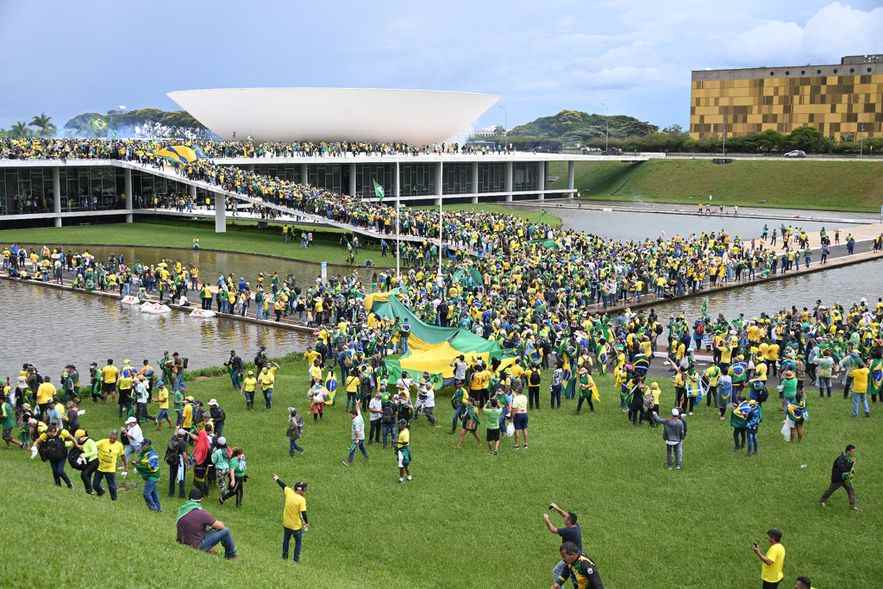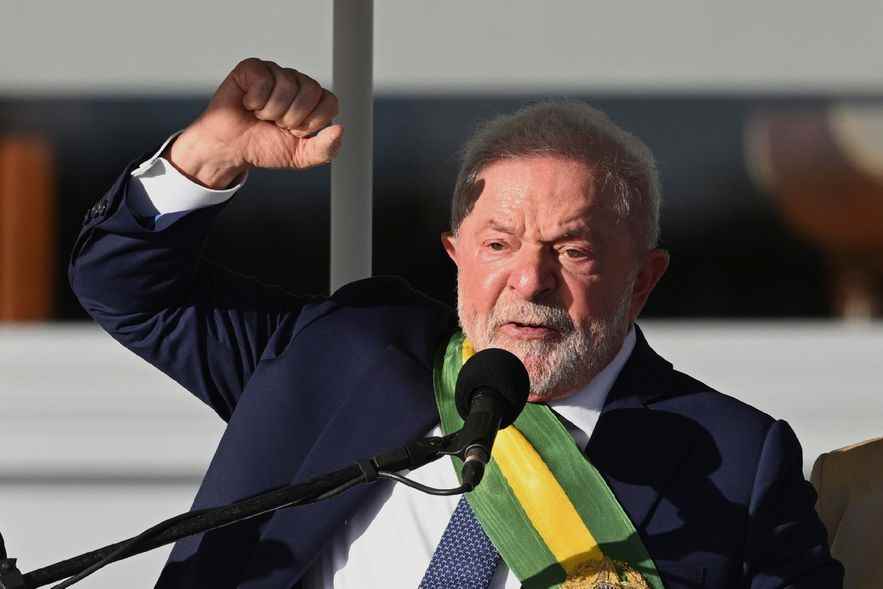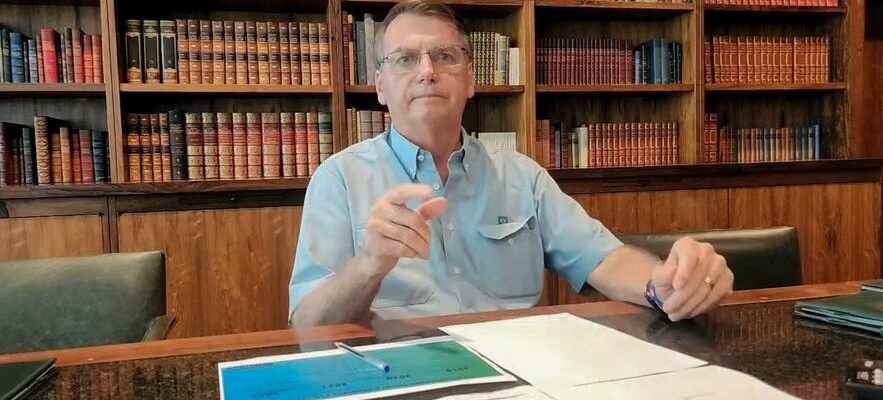Two years, almost to the day, the scenario of the assault on the Capitol repeated itself. Yesterday, in the middle of the Brazilian summer vacation, a week after Lula’s return to power in Brasília and while his predecessor Jair Bolsonaro was in Florida, the latter’s most extremist supporters stormed and ransacked the symbols of Brazilian democracy: the presidential palace named Planalto, the Congress and the Federal Supreme Court – three buildings designed by the architect Oscar Niemeyer and inaugurated at a time (in 1960) when the Portuguese-speaking country seemed to have a bright future.
From the assault on the Capitol on January 6, 2021, in Washington, to that of Brasília on January 8, 2023, there is a continuum. Bolsonaro, nicknamed the “Trump of the tropics”, has never hidden his admiration for his American mentor. And Eduardo Bolsonaro, 38, one of his sons, is a close friend of Donald Trump Jr., 45, one of Donald Trump’s three sons. Better: ex-President Bolsonaro has been in South Florida for a few days. This allowed him to avoid the January 1 handover ceremony in Brasília and also to protect himself from possible legal proceedings, which he fears. Above all, it seems hard to imagine that he did not go to Mar-a-Lago in Palm Beach, both Donald Trump’s main residence, private club and 128-room hotel.
Photo taken from a video posted by Brazilian President Jair Bolsonaro on his YouTube account on November 2, 2022, where he assures his supporters that “we will not see the end of the world on January 1” when leftist Lula takes office, in Brasilia, on December 30, 2022
© / afp.com/Handout
Be that as it may, Brasília is not Washington. And the two attacks are not alike – even if their anti-democratic natures are identical. In the American capital, Donald Trump had delivered a speech which had white-hot his supporters, who had then marched on the Capitol, like the fascists marching on Rome in 1922. In Brasília, Bolsonaro was not there. Another difference: the official buildings of the Brazilian capital were empty, on this Sunday afternoon of the long school holidays. And the parliamentary session was not open. No elected official was present.
In Washington, on the contrary, the assailants had surrounded and threatened all of the parliamentarians as well as Vice-President Mike Pence, giving the event an extremely serious character. Moreover, the attack had taken place during the period of more than two months which runs between the election and the assumption of office of the American presidents. A simple “president-elect”, Joe Biden had not yet taken the oath on the Constitution, nor taken office in the White House. Conversely, Jair Bolsonaro left power for more than a week, replaced by Lula who, too, was not in the Brazilian capital at the time of the riot.

Supporters of far-right ex-president Jair Bolsonaro invade the Esplanade des Ministries on January 8, 2023 in Brasilia.
© / afp.com/EVARISTO SA
This post-transition timing could lead one to think, wrongly, that the scenario evoked by The Express, on August 4, could be dismissed. “A remake of the assault on the Capitol in Washington is it possible in Brasília, we wrote. With the approach of the presidential election in October, this disaster scenario is not excluded.” In an article titled “If Bolsonaro clings to power… The scenario that shakes Brazil”, political scientist Carlos Augusto Poggio explained: “Bolsonaro knows he is going to lose. So he wants to cause mayhem, before, during and after the elections. Clearly, he is following Trump’s model. But our institutions are more fragile than those of the United States, which stopped the ex-president.”
When Bolsonaro sang the praises of a torturer
The South American historical context, with its share of dictatorships, is indeed different. “In Brazil, the polarization opposes those nostalgic for the military regime (1964-1985) and the supporters of the democratic pact, from the 1988 constitution, notes the historian Silvia Capanema. In passing, let us recall that in 1979, the amnesty pronounced by the military made it possible to absolve the torturers of the dictatorship at the same time as the members of the urban guerrillas (which had belonged to the ex-president Dilma Rousseff), which was a way of putting them on the same level .”
A lecturer at the Sorbonne Paris Nord University, the historian remarks: “The national career of the obscure deputy and ex-army captain Jair Bolsonaro began on the day of the controversial dismissal of Dilma Rousseff in 2016. He then took the liberty of paying public homage – in the precincts of parliament! – to Colonel Ustra, a well-known torturer of the dictatorship. And this to the applause of certain colleagues.” A sordid episode which translates a reality: in Brazil, the members of the dictatorship were never really worried and no work of memory or reconciliation was ever seriously carried out.
Federal Supreme Court hated by protesters
This story allows both the emergence of a character such as Jair Bolsonaro and the uprising in Brasília, which was organized on social networks and, probably, under the covers, by a number of actors hostile to the left . Among them: certain sectors of the police, the army and the world of agribusiness. It is no coincidence that the police in Brasília were so slow to mobilize in the first hours of the insurrection, especially around the building of the Federal Supreme Court hated by the demonstrators who accuse him of having extinguished the legal proceedings against Lula in 2021 – which put him back in the saddle politically after the accusations of corruption against him – and for having ratified the result of the presidential election which ended in a narrow defeat for Bolsonaro.

Brazil’s new president, Luiz Inacio Lula da Silva, delivers an inaugural speech after his swearing-in ceremony at the National Congress, in Brasilia, January 1, 2023
© / afp.com/EVARISTO SA
“The idea of those who foment the revolt consists in creating the sensation that there exists in Brazil a popular discontent and a social disorder such that an intervention of the army would be necessary: it is a question of creating a pretext for a questioning of the election, explains a person close to the Brazilian presidential palace on condition of anonymity.The intention of the insurgents is also to intimidate the centrist members of Congress who dropped Bolsonaro to support Lula and remain faithful to the democracy of 1988. It may or may not work, depending on whether other supposedly spontaneous movements break out in the next few hours in major cities, including Rio de Janeiro and Sao Paulo. But I don’t believe it, “completes the same interlocutor.
However, it is difficult to imagine that Bolsonaro benefits from this coup. Donald Trump himself emerged weakened from the assault on the Capitol – which many Republicans do not forgive him. Lula, for his part, starts his presidency with a major crisis on his hands. And this, in a country where his predecessor placed 6,000 soldiers at all levels of the administration. The reluctance of a large part of the army towards him was also felt ten days ago when senior Navy officers resisted for forty-eight hours the appointment of a new senior commander to the top of the armada.
“The Navy is 70% hostile to Lula”
During the transfer of power to his successor appointed by Lula, Admiral Almir Garnier Santos thus chose not to attend the ceremony. A breach of protocol highly unusual in the armed forces. In the Navy, it is even the first time that a change of command has taken place without the presence of the predecessor. “The Navy is 70% hostile to Lula,” says our source close to the presidency who reassures: “But in the army and the air force, the atmosphere is more peaceful.”
An experienced and skilful politician, master in the art of negotiation and persuasion, President Lula, aged 73, will have to deploy all his talent in order to navigate between the pitfalls that are already presenting themselves, only a week after his return to Brasília where a first serious crisis began, of which no one has yet measured all the repercussions, visible or underground.
